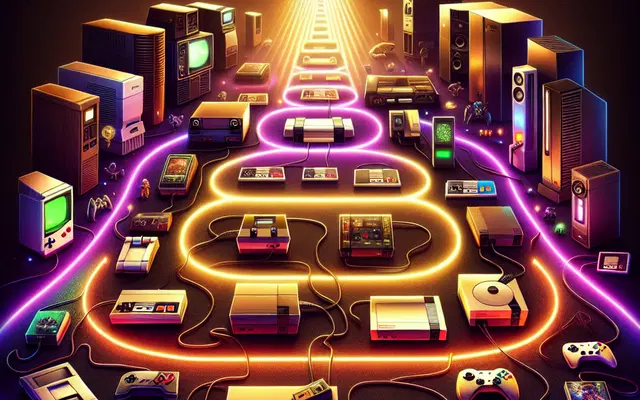Diving into the Evolution of Gaming Consoles and Their Impact on Gaming Gadgets

From Joysticks to VR: The Revolution of Console Gaming
The gaming industry has witnessed a remarkable transformation from the clunky joysticks of the 1970s to the immersive virtual reality (VR) systems of today. This revolution extends beyond mere convenience, impacting not only the way games are played but also how they are developed and marketed. As gaming consoles have evolved, they've become more than just entertainment devices; they're gateways to vast digital worlds. The advancement of console technology has spurred the growth of gaming gadgets, with items like motion controllers and VR headsets enhancing the interactive experience and deepening players' engagement.
With the onset of powerful and compact gaming consoles, we've seen a surge in the popularity of portable gaming gadgets. Handheld devices such as the Nintendo Switch have redefined what it means to play on the go, offering console-quality experiences in a portable format. This has opened up new possibilities for gaming anywhere and anytime, revolutionizing the concept of mobile entertainment. The rise of portable play has not only provided gamers with unprecedented flexibility but also challenged developers to innovate further, leading to the creation of more advanced and versatile gaming gadgets.
Iconic gaming consoles have played a pivotal role in shaping the landscape of popular game titles. Each generation of consoles has brought with it a slew of games designed to showcase the hardware's capabilities, from the pixelated adventures on Atari to the rich, immersive worlds on PlayStation 5 and Xbox Series X. These consoles have not only defined genres but have also elevated gaming to a form of cultural expression. As such, the 'Titans of Gaming' like Sony, Microsoft, and Nintendo have not only molded popular game titles but have continuously influenced the evolution of gaming across the globe.
Gaming Gadgets Unleashed: The Rise of Portable Play
The gaming industry has been on a relentless evolutionary path, with gaming consoles at the heart of this transformation. Early consoles were simple devices, offering rudimentary games that relied on basic controls like joysticks and buttons. But with the advent of cutting-edge technology, consoles now boast powerful processors, high-resolution graphics, and immersive gameplay that rival the experience of playing on a PC. This shift hasn't just changed the gaming landscape; it's also given rise to an array of gaming gadgets. From motion-sensing controllers to VR headsets, these gadgets have extended the console's reach, making gaming more accessible and engaging than ever before.
As gaming consoles have become more versatile and powerful, portable gaming gadgets have surged in popularity. Once tethered to living room TVs, gaming experiences can now be carried in our pockets and backpacks. Devices like the Nintendo Switch blend the line between home and portable consoles, offering quality gaming experiences on the go. Meanwhile, advances in mobile technology have led to smartphones becoming potent gaming platforms in their own right, with accessories that transform them into handheld consoles – a trend that shows just how much the industry values flexibility and convenience.
The rise in sophisticated gaming consoles has also paved the way for game developers to create more complex and captivating titles. Today's popular game titles are often designed with console capabilities in mind, harnessing their computing power and control schemes to deliver breathtaking experiences. This has resulted in iconic franchises and groundbreaking gameplay that have defined generations. Gaming consoles, therefore, are not just entertainment devices; they are the catalysts that have helped shape the narratives and mechanics of the games we love, echoing through the entire ecosystem of gaming gadgets.
The Titans of Gaming: How Consoles Molded Popular Game Titles
The meteoric rise of console gaming has been pivotal in shaping the titles that capture the hearts of gamers around the world. With the advent of each new generation of gaming consoles, developers have gained access to more advanced technology, allowing for more intricate storytelling, expansive worlds, and immersive gameplay. Iconic franchises such as 'The Legend of Zelda' and 'Halo' have evolved alongside consoles, leveraging the enhanced capabilities to deliver groundbreaking experiences. The symbiotic relationship between gaming consoles and popular game titles has not only driven the success of the industry but has also set new standards for what players expect from their gaming experiences.
The impact of gaming consoles on popular titles extends beyond the visual and auditory enhancements. These powerful machines have facilitated complex multiplayer experiences both locally and online, fostering a sense of community and competition that has become integral to gaming culture. Games like 'Fortnite' and 'Call of Duty' have thrived in the console environment, offering players robust online platforms to engage and connect with others across the globe. The ease of access and standardized systems provided by consoles have empowered developers to focus on creating rich, interactive environments where players can create, share, and participate in their favorite gaming worlds.
As gaming consoles continue to evolve, so too does the narrative depth and artistic expression found within popular game titles. Once perceived as mere entertainment, many modern games now deliver complex storylines that rival film and literature, enriched by consoles' ever-increasing processing power. Moreover, the convergence of gaming and social commentary becomes more pronounced as titles like 'The Last of Us' and 'BioShock' explore themes that resonate with a mature audience. The console's role in this storytelling revolution cannot be understated, providing a canvas for creators to present nuanced narratives that captivate and challenge players.












